Alabama Power receives approval for solar facility in Butler County

The Alabama Public Service Commission today approved Alabama Power’s proposal for an 80-megawatt HEP Greenville solar project to be located in Butler County. The commission also approved a contract between Alabama Power and Wells Fargo to allow the bank to subscribe to a portion of the Renewable Energy Certificates (RECs) from the newly approved facility. This solar project is the largest facility to date under the Renewable Generation Certificate approved by the commission in 2015. Annual output generated from the HEP Greenville solar project is equivalent to the amount of energy used in nearly 15,000 homes. Under the 10-year contract, Wells Fargo will receive about 47% of the RECs from the solar facility, equivalent to 80,000 MWh annually and representing about 80% of its electric needs in the state. Alabama Power will market the remaining RECs from the project to other customers. The project is expected to create about 250 construction jobs while generating more than $6 million in tax revenue for Butler County and the city of Greenville over the life of the project. Commercial operation is expected to begin by January 2024. “We appreciate the commission’s vote today and are excited about our partnership with Wells Fargo to build on our focus of delivering long-term value to our customers while growing solar resources,” said Tony Smoke, Alabama Power’s senior vice president of Marketing and Economic Development. Since 2017, Wells Fargo has met 100% of its global electricity requirements with renewable energy through the purchase of RECs. Today’s announcement transitions the firm’s efforts to long-term agreements that support the development of net-new sources of renewable energy. To date, Wells Fargo has entered into more than 120 long-term contracts, supporting the development of more than 825 megawatts of net-new renewable energy. In addition to helping Wells Fargo meet its environmental goals, the strategy helps deliver community benefits like job creation, tax revenue, and economic development where its customers and employees live and work. “Leveraging our annual energy spend to advance green infrastructure development in the U.S. and create new revenue streams for communities is one way we are helping contribute to more sustainable, equitable, and resilient communities,” said Richard Henderson, head of Wells Fargo’s Corporate Properties Group. “We appreciate the collaboration with Alabama Power to advance our enterprise sustainability goals in a way that benefits the local economy.” This project is the fourth approved under the Renewable Generation Certificate, in addition to the Anniston Army Depot, Fort Rucker, and LaFayette solar projects. To date, the commission has approved about 170 megawatts of solar generation under this certificate. By Alabama NewsCenter Staff
Lawsuit says Alabama blocking solar power with unfair fees

The fees imposed by the Alabama Power company on customers who generate their own electricity with rooftop or on-site solar panels are now the subject of a federal lawsuit against the state’s regulators. Environmental groups argue that punishing fees are purposely discouraging the adoption of solar power in the sun-rich state. Alabama Power maintains that the fees are needed to maintain the infrastructure that provides backup power to customers when their solar panels don’t provide enough energy. The Southern Environmental Law Center and Ragsdale LLC filed the lawsuit on Monday against the Alabama Public Service Commission on behalf of four Alabama Power customers who installed solar panels on their properties and the Greater-Birmingham Alliance to Stop Pollution, or GASP. “We’re asking the court to require the Commission to follow the law so that Alabama Power will stop unfairly taxing private solar investments,” said Keith Johnston, director of SELC’s Alabama office. “Alabama is being left behind by other Southern states when it comes to solar generation, and the jobs, bill savings, and other benefits that come with it,” SELC’s statement said. “These charges are a significant roadblock to our state’s success.” A spokesperson for the Public Service Commission wrote in an email that “it would not be appropriate for the Alabama Public Service Commission to comment on pending litigation.” Alabama Power charges a $5.41-per-kilowatt fee, based on the capacity of the home system, on people who use solar panels or other means to generate part of their own electricity. That amounts to a $27 monthly fee on a typical 5-kilowatt system. The average solar panel setup for home costs about $10,000, according to the law center, and the fees add another $9,000 or so over a system’s 30-year lifespan, dramatically increasing costs and reducing any financial benefit for the homeowner. Alabama Power maintains that the fees are needed to maintain the infrastructure that provides backup power. A spokesperson for Alabama Power said, “We believe Alabama law and sound rate-making principles were followed in reaching a fair determination of the cost for this service.” “It is important to us that all of our 1.5 million customers are treated fairly. There is nothing about the lawsuit that changes our position – we believe the lawsuit is without merit. Customers who want to rely on the company to back up their own generation should pay their share of associated costs,” Alabama Power spokesperson Alyson Tucker wrote in an email. The Federal Energy Regulatory Commission rejected the environmental groups’ request to take enforcement action last month against the Public Service Commission. However, two members of the five-member panel issued a separate statement expressing concern that Alabama regulators may be violating federal policies designed to encourage the development of cogeneration and small power production facilities and to reduce the demand for fossil fuels. Republished with the permission of the Associated Press.
Homeowners, group seek action on Alabama Power’s solar fee
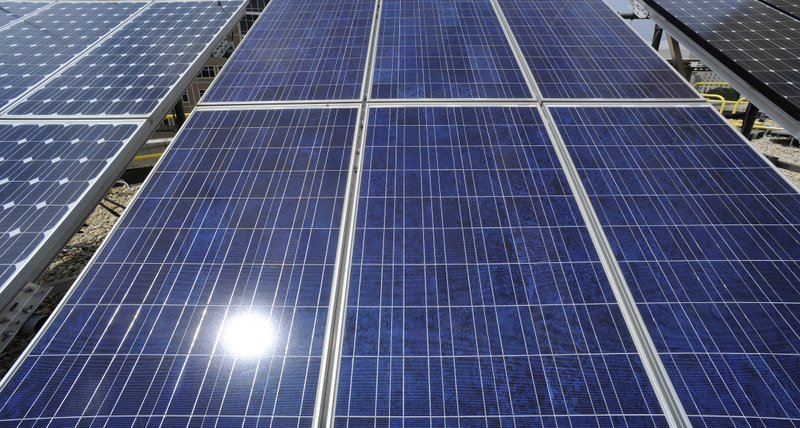
Homeowners and an environmental group are asking federal regulators to step in over Alabama Power’s fees on home solar panels, fees they argue purposely discourages the use of solar in the sun-rich state. The petition filed with the Federal Energy Regulatory Commission asserts that the Alabama Public Service Commission violated federal law when it upheld the fees. It asks the commission to initiate an enforcement action against the PSC and direct the state agency to order Alabama Power to sell electricity to solar customers at nondiscriminatory rates. “By imposing one of the highest fees on solar customers of any regulated utility nationwide, Alabama Power’s unjustified solar charges are severely curtailing renewable energy development in our state, and other states are leaving Alabama behind because of it,” Keith Johnston, director of Southern Environmental Law Center’s Alabama office. “We are asking FERC to exercise its authority to enforce federal protections for solar customers in Alabama Power’s service territory.” The action comes after the Alabama Public Service Commission last year upheld the fees and approved an increase. Alabama Power charges a $5.41-per-kilowatt fee, based on the capacity of the home system, on people who use solar panels, or other means, to generate part of their own electricity. That amounts to a $27 monthly fee on a typical 5-kilowatt system. The average solar panel setup for a home costs about $10,000, according to the Environmental Law Center. The fees add another $9,000 or so over the 30-year-lifespan of a system, dramatically increasing a homeowner’s cost and reducing any financial benefit they see from solar. Alabama Power has maintained the fee is needed to maintain the infrastructure that will provide backup power to customers when the solar panels don’t provide enough energy. “Alabama Power is focused on providing customers with safe, reliable, cost-effective energy. This issue was fully examined by the Alabama Public Service Commission, which included a lengthy public hearing, with the plaintiffs choosing not to pursue the case further in state court,” Alabama Power spokeswoman Alyson Tucker wrote in an email. “Customers with on-site generation who want backup service from the grid should pay the cost for that service. If not, other customers unfairly pay the costs for those individuals and businesses,” Tucker said. Experts for environmental groups said the charge eliminates much of the savings that customers expect to realize for their investments in installing solar panels. Teresa Thorne, who had a four-kilowatt system installed on her roof in Blount County, Alabama, told The Associated Press last year that the fees, “cuts my savings in half.” “Alabama Power’s monthly fee makes it extremely difficult for people like me who want to install solar to lower their monthly bills and generate clean energy,” Thorne said in a statement released by the Southern Environmental Law Center. Republished with the permission of the Associated Press.
Secretary of State John Merrill awards Alabama Power, others for polling place help after Zeta
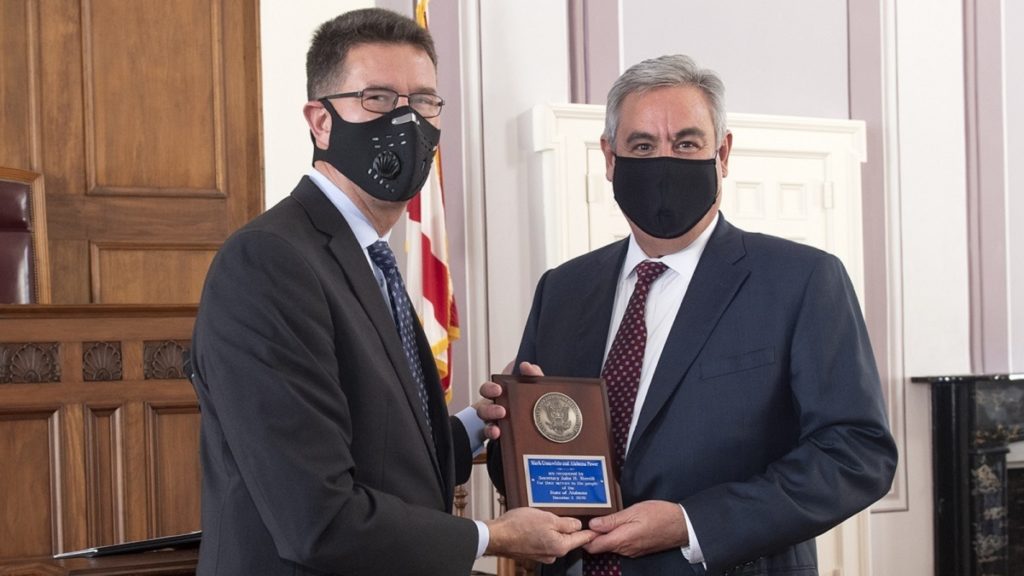
Hurricane Zeta will be remembered as one of the most destructive storms in Alabama history and for its late-season impact – days ahead of the Nov. 3 election. Zeta left many in the state without power, with companies executing a significant response to provide service to both those affected and polling locations for voters to safely cast their ballots. In acknowledgment of this multifaceted response from the public and private sectors, Secretary of State John Merrill on Wednesday presented six National Association of Secretaries of State (NASS) Medallion Awards “to recognize outstanding service and dedication to furthering the mission of NASS.” Merrill gave medallion awards to Alabama Power, PowerSouth, the Alabama Rural Electric Association, the Alabama Municipal Electric Authority, the Alabama Emergency Management Agency, and the Office of Information Technology for their efforts to ensure polling locations had power and that Alabama would have a smooth and successful election. “We are incredibly appreciative of the leadership of Alabama Power, and all organizations recognized today, who stepped up during the state’s time of need to protect our democracy. These brave men and women worked tirelessly around the clock to see that every eligible Alabamian had the ability to successfully cast his or her ballot during the general election,” Merrill said. “On behalf of all the Alabama Power team, it’s an honor to receive this award alongside the other organizations that serve our state,” said Alabama Power CEO Mark Crosswhite. “The damage from Zeta was the third-worst in our company history, requiring a strategic, multiday restoration effort. We appreciate the partnership with the Secretary of State’s office, election officials across the state, and the work of all the utility workers who assisted to restore service to polling locations, ensuring Alabamians had the opportunity to exercise their right to vote.” The ceremony took place in the Old House Chamber at the Capitol in Montgomery. Recipients of the National Association of Secretaries of State Medallion Awards stand with Alabama Secretary of State John H. Merrill. (Wynter Byrd / Alabama NewsCenter) Story and images republished with permission of the Alabama News Center.
Email Insights: Business Council of Alabama (BCA) announces new board

The ups and downs of the Business Council of Alabama (BCA) have been steep over the last several years.
Alabama Power fees on solar challenged

Jim Bankston installed solar panels on his Tuscaloosa home, he estimated it would trim his electricity bill, and the savings would eventually offset the cost of the hefty investment. After it was running, he noticed fees on his Alabama Power bill that he didn’t understand and learned there was a $5-per-kilowatt capacity charge on customers who use solar panels to produce a portion of their own electricity. “I am having to pay them just to use the photons that are hitting my own roof,” Bankston said. He had estimated the system would eventually pay for itself in 20 years. With the fees included, he said it could be twice that. “I won’t be alive anymore, maybe,” the 45-year-old radiologist says wryly, also noting that it also might be beyond the life span of the panels he installed. The Alabama Public Service Commission will hold a Nov. 21 hearing on a challenge to the fees charged by Alabama Power. The utility says the fees are needed to provide backup power for customers. But critics say the fees are some of the highest in the nation and make it harder for people to use alternative energy sources. “It’s discouraging the use of solar,” said Keith Johnston, managing attorney for the Southern Environmental Law Center’s Birmingham office. “We call it a solar tax.” The fee is based on the size of the solar system, so a five kilowatt system would have a monthly fee of $25. The average solar panel setup for a home costs about $10,000, according to the environmental law center. The fees add another $9,000 over the 30-year-lifespan of a system, dramatically increasing a homeowner’s cost and reducing any financial benefit they see from solar, the law group said. Johnston says they haven’t found a large investor-owned utility with fees as high as those being charged in Alabama. “It’s definitely one of the highest.” The petition asks the commission to bar Alabama Power from collecting the fee. Alabama Power is asking utility regulators to dismiss the complaint. They said the $5 fee is actually not enough and are asking to be allowed to increase the charge to $5.42 per kilowatt. Alabama Power said there is an important reason for the fees: The company has to maintain power grid infrastructure to provide backup power if the panels don’t provide enough energy. “There is a cost to having back-up power available to customers, including customers with solar systems who remain tied to the grid for backup service,” Alabama Power spokesman Michael Sznajderman said. He said the capacity reservation charge applies to anyone who has some type of onsite generation and still needs backup from the grid. People who go off grid “avoid any and all costs related to Alabama Power serving them,” he said. He said the company believes it has a compelling case in the upcoming hearing and is “focused on protecting all our customers and ensuring that those who use certain services pay for those services.” The issue of fees has arisen in New Mexico, Arizona and other states, causing clashes between renewable energy proponents and utilities. A power company in Iowa unsuccessfully pushed lawmakers to approve a fee that would require a homeowner with an average solar array to pay about $27 a month. “I think they are really intended to discourage customers from installing solar,” Gwen Farnsworth, a senior energy policy adviser with Western Resource Advocates, a Colorado-based conservation group. Farnsworth said the Alabama charge is “quite high.” Teresa Thorne, 65, had a four kilowatt system installed on her roof in Blount County, Alabama. She wanted to support solar and maybe in the process save a little money on her power bill. The $5-per-kilowatt capacity charge amounts to an extra $20 on her power bill. She said while that doesn’t sound like much, it slashes the savings she expected to see after investing thousands of dollars to install the system. “It cuts my savings in half,” Thorne said. Thorne said she tells people interested in solar for economic reasons that the fees make it not “economically feasible to do it in my opinion.” “I would not have done it if I’d known. That’s the bottom line. If I truly understood it was going to cost me half of the savings,” Thorne said. Republished with the permission of the Associated Press.
Utility-scale solar projects brighten Alabama’s tech recruitment efforts
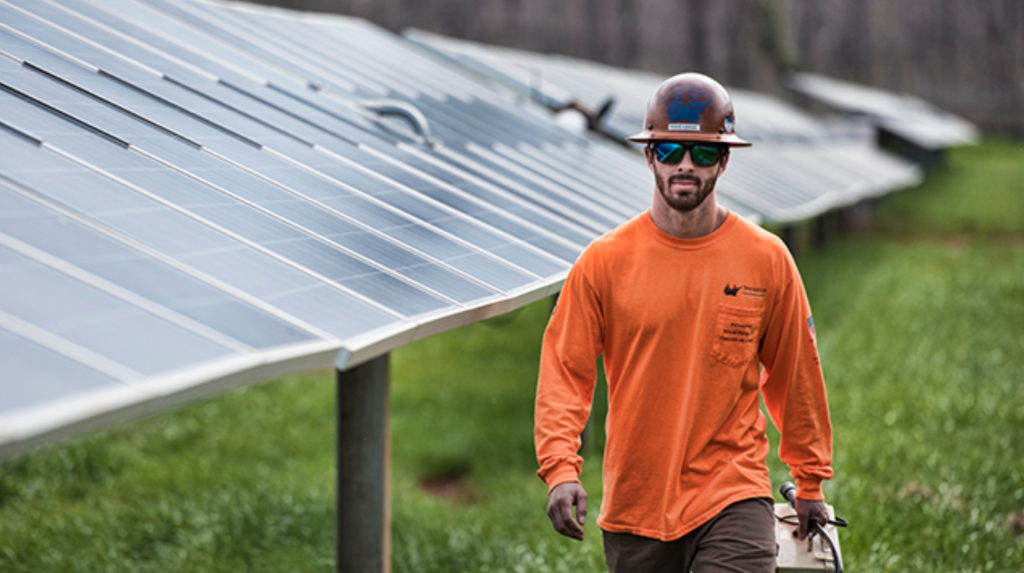
Massive new utility-scale solar farm projects are poised to dramatically expand Alabama’s solar power capacity as major technology companies make their first significant investments in the state. In the last three months alone, the Tennessee Valley Authority has announced plans for large solar installations in North Alabama tied to data centers being constructed by Google in Jackson County and Facebook in Huntsville. The new projects build on solar capacity in Alabama that only recently came on line. Alabama Power has also helped military bases in the state by installing solar projects to help them meet their goals. Alabama Power is using all the energy from the military projects and a portion from a Chambers County project to support its renewable programs. In the latest projects, TVA is teaming with developer First Solar to build what will be Alabama’s largest solar farm in Colbert County, serving Facebook. With an output of 227 megawatts, this project alone will almost double Alabama’s installed solar capacity of 252 megawatts, according to data from the Solar Energy Industries Association. “Solar power has a bright future for families in the Tennessee Valley if we can continue to attract top-tier companies like Facebook,” Doug Perry, TVA vice president of Commercial Energy Solutions, said in an announcement. Greg Canfield, secretary of the Alabama Department of Commerce, said the state’s economic development team is making a strategic push to recruit technology companies such as Facebook and Google. “These are world-class companies, and initial projects in Alabama represent an important first chapter in the growth of our high-tech sector,” Canfield said. “We’re working hard to set the stage for the arrival of other technology companies and the high-paying jobs they bring with them.” Like many high-tech companies, Facebook and Google have a commitment to using renewable energy. Between them, the companies are investing more than $1.3 billion in their Alabama data center projects. ‘Development boom’ These new utility-scale projects are rapidly expanding the state’s renewable energy landscape. TVA’s projects for Google and Facebook, which also include new solar farms in Tennessee communities, may have even set a precedent, according to pv magazine USA, an industry publication. “The net total of Google and Facebook’s actions are a development boom. If you had said last year that Alabama and Tennessee were on track to add 790 megawatts over just two development announcements, you’d have been accused of blasphemy,” pv magazine noted. In January, Google announced that in coming years it will purchase 413 megawatts of power from TVA for data centers it is building in Bridgeport, Alabama, and in Tennessee. The solar installation in Hollywood, Alabama, will produce around 150 megawatts. The two facilities will have 1.6 million solar panels. “These solar sites will be among the largest renewable energy projects in the Tennessee Valley region, and the largest solar farms ever to be built for Google,” the company noted in a blog post. “Thanks to the abundant solar power generated by these new farms, electricity consumed by our data centers in Tennessee and Alabama will be matched with 100 percent renewable energy from day one.” Last November, TVA announced plans for the Colbert County solar farm and a smaller facility in Tennessee, whose combined output of 377 megawatts will serve the Facebook data center in Huntsville. “This partnership aligns the core values of TVA’s public power model with Facebook’s mission to bring the world closer together — powered by renewable energy,” Perry said. Tracking the sun In LaFayette, Houston-based Centaurus Renewable Energy operates a 72-megawatt solar installation called AL Solar A. The facility sits on 1,100 acres in Chambers County and is made up of more than 338,000 solar panels that automatically track the sun for optimum efficiency. Alabama Power has a long-term power-purchase agreement with Centaurus to market the output of AL Solar A to its customers, chiefly to Walmart, which has adopted long-term sustainability goals. “Sourcing renewable energy from the AL Solar A project plays a crucially important role in providing power for Walmart facilities throughout Alabama,” Steve Chriss, director of Energy and Strategy Analysis for Walmart, said at an event marking the facility’s opening last year. Alabama Power has been involved in two other large-scale renewable energy projects, both on military bases in the state. A 10-megawatt installation at Fort Rucker comprises more than 115,000 solar panels on 90 acres. A 7-megawatt facility at Anniston Army Depot uses more than 87,000 solar panels. In addition to its planned projects, TVA purchases power from the River Bend Solar Energy Center in Lauderdale County. Operated by NextEra Energy Resources, the facility’s 300,000 solar panels have a generating capacity of 75 megawatts. Alabama could be in line for more large-scale TVA solar projects. Late last year, TVA said it is planning to invest $8 billion in renewable energy over the next 20 years. Alabama has another connection to solar power – on the manufacturing side. In June 2018, LG Electronics announced plans to invest $28 million to open an advanced solar module assembly plant in Huntsville, creating 160 jobs. LG’s new Alabama factory is expected to produce 500 megawatts of the company’s high-performance N-type solar panels annually, equivalent to about 1 million panels each year. This story originally appeared on the Alabama Department of Commerce’s Made in Alabama website. Republished with permission from the Alabama NewsCenter.
Alabama Power honored for diversity efforts at Birmingham Equal Opportunity Dinner

The Birmingham Urban League honored corporate citizens and community leaders Saturday, Dec. 8 at its Equal Opportunity Dinner. According to its organizers, the annual gala recognizes efforts that help in advancing equal opportunity for all. Alabama Power received the President’s Award for contributions to the community and its consistent support of the organization and diversity. Birmingham Division Vice President Jonathan Porter accepted the award on behalf of the company. “Alabama Power is proud of the continued partnership with organizations such as the Birmingham Urban League to help propel our community forward,” said Porter. The dinner was also held to commemorate the Birmingham Urban League‘s 50 years of service to the community. U.S. Sen. Doug Jones and U.S. Rep. Terri Sewell were the event co-chairs. National Urban League president Marc Morial was the keynote speaker for the evening. Morial recognized Birmingham’s first African-American mayor, Richard Arrington, saying the nation should appreciate Birmingham. Former Mayor William Bell was also honored for his leadership and his work in revitalizing the City of Birmingham. Mayor Bell shared a light moment with the audience, saying that even after completing his term serving the city, his wife still encourages him to “get out and go be great.” Other organizations such as Alpha Kappa Alpha Sorority, United Way of Central Alabama and Peacemakers was honored as well. More than 200 guests were treated to comedy and entertainment at the dinner. Republished with permission from the Alabama NewsCenter.
Alabama Power has restored all Tropical Storm Gordon outages in the state
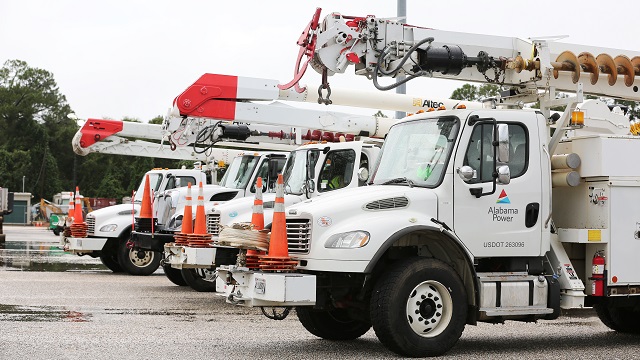
Alabama Power has restored electricity to all customers who lost power due to Tropical Storm Gordon. The company said as of 11 a.m. Thursday, no customers who lost power due to the storm were still without power. Throughout the course of the storm, nearly 75,000 customers were affected, though there were never more than 31,000 customers without power at any given time due to the weather system. Close to 1,000 Mobile-area linemen, evaluators, contractors and other crew members were involved in the restoration. Additional support from the central part of the state was mobilized Wednesday, with crews traveling to the Mobile area to assist in restoration efforts. Alabama Power established a staging area at the Mobile Greyhound Park in Theodore, serving food to workers and refueling and resupplying trucks as needed. Alabama Power employees eat dinner at a staging area for Tropical Storm Gordon established at Mobile Greyhound Park in Theodore. [Photo Credit: Mike Kittrell / Alabama NewsCenter] Republished with the permission of the Alabama Newscenter.
Alabama Power prepared for Tropical Storm Gordon
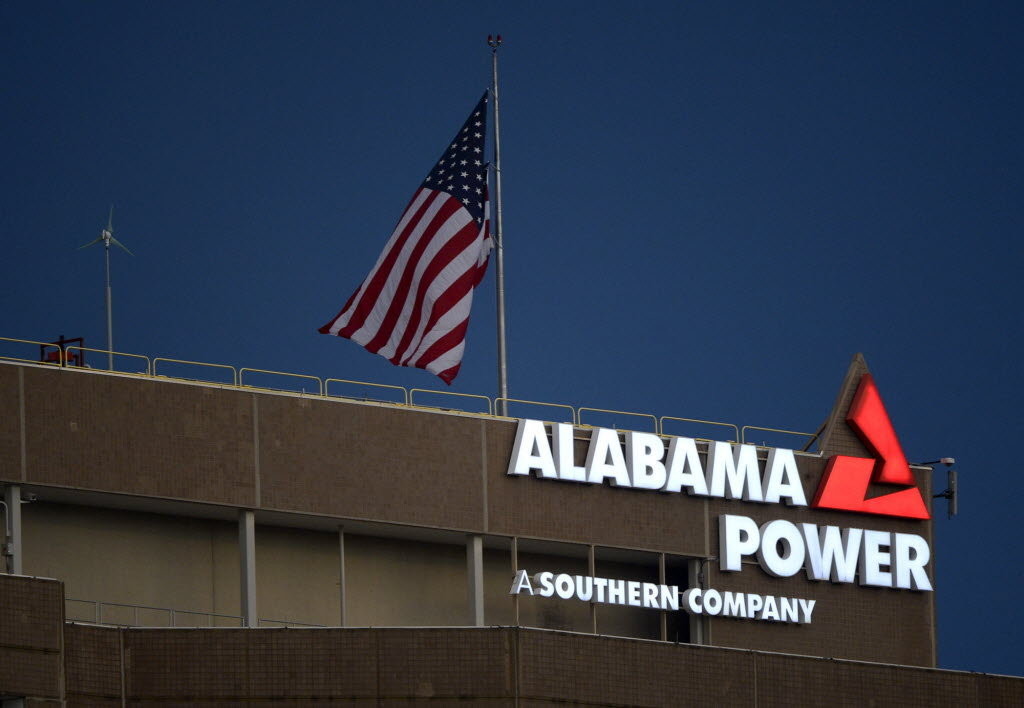
Alabama Power is preparing for Tropical Storm Gordon as it strengthens this afternoon and heads toward the Gulf Coast. Alabama Power crews and personnel are ready to respond, if needed. Current forecasts predict Gordon will make landfall on the central Gulf Coast overnight Tuesday. The forecasts suggest Gordon could intensify to hurricane-strength before arriving on shore in Alabama, Mississippi or Louisiana. The storm is expected to drop between 4 and 12 inches of rain in the western Florida panhandle, southwest Alabama, central Mississippi, eastern Louisiana and into southern Arkansas. Alabama Power crews are preparing for any damage or outages that may come when Tropical Storm Gordon makes landfall in the state later today. [Photo Credit: file/Alabama Newscenter] Forecasters say southwest Alabama, including the metro Mobile area, will be affected by high winds and heavy rainfall, with the possibility of flash flooding. Downtown Mobile also faces potential flooding. Gov. Kay Ivey issued a state of emergency at 7 a.m. Tuesday for Baldwin, Choctaw, Clarke, Conecuh, Escambia, Mobile, Monroe and Washington counties. “All coastal Alabama residents need to prepare now ahead of tonight’s potential landfall near Alabama,” Ivey said. “I have directed essential state agencies to be on the ready should they be needed over the next couple of days.” Localized flooding is possible across the southern portion of the state. Dangerous wind gusts of up to 45 mph will be an issue as the storm makes landfall. Tornadoes also are possible. Based on current forecasts, the Mobile area will see the greatest impact from this storm in Alabama before it moves north and west on its forecasted track through Mississippi, Louisiana and toward Arkansas. Heavy rain and gusting winds could cause trees to fall. As always, safety is a top priority for all Alabama Power. Individuals, families and businesses in the projected path of the storm should take precautionary measures and make sure they have a hurricane plan, including a fully stocked emergency supply kit. Click here for specific tips related to hurricane preparedness. Alabama Power customers who experience storm-related outages can report them online via mobile devices at www.alabamapower.com. Customers also can call the company’s automated outage reporting line at 1-800-888-APCO (2726). Republished with the permission of the Alabama Newscenter.
Steve Flowers: BCA is back, bigger and better than ever

Alabama Power is and has always been a force in Alabama politics. Some entities may have influence in the Legislature, but the power company has the ear of folks in all three branches of State government: Legislative, Executive and Judicial. If you sat down with all 35 state senators, especially the veterans who know the ropes and the system, and you had an extensive off-the-record private conversation with each of them, and you asked them if you had to have one special interest group in your corner and you were in a tough race to get reelected or wanted to get something accomplished, who would you call. In other words, to quote the great Dr. Paul Hubbert, who would you call if your ox got into a ditch?It would be an overwhelming vote for Alabama Power. Alabama Power is the friend, and confidant that both Democratic and Republican senators and representatives would name. The company is known for listening to legislators and treating them fairly and honestly, and it is truly nonpartisan in its approach. Typically, the power company prefers anonymity. It certainly does not seek attention or accolades. However, legislators, judges, and governors have never been reluctant or ashamed of being aligned with the interests of the company or seeking contributions from its employee-operated political action committee. Over the years there has been a shell game of attempting to hide campaign contributions from some corners; not so with Alabama Power and its employees PAC. They do not play nefarious, clandestine, hiding-the-money shenanigans. They play by the rules. When you inquire of those 35 senators why they want and are proud of the power company’s support, they will quote an old saying used among Goat Hill veterans, “What’s good for Alabama Power is good for Alabama,” because if Alabama grows and prospers, if the state is drawing new industry and existing businesses are expanding, and Alabamians are using more electricity, Alabama Power prospers. During the 1960’s, George Wallace had demagogued the race issue and had become the Emperor of Goat Hill. The issue of race was a powerful tool. Wallace was a brilliant politician and knew how to use power. When African Americans gained the right to vote Wallace had to find him another boogeyman. He took a page from Huey Long and started cussing the big utilities. During this Wallace vendetta, Alabama Power had a president named Joe Farley, who was a great business leader, but not particularly enamored with Montgomery politics. Fortunately, he had a real pro representing the company on Goat Hill in the form of Walter Johnsey. Walter stood toe-to-toe with Wallace. After Wallace, a triumvirate of power made up of AEA/Labor and trial lawyers ruled the roost. The plaintiff trial lawyers became greedy and made Alabama the laughing stock of the Nation with outrageous, ludicrous judgements. We were called “Tort Hell” by “Time Magazine.” No industry would come to Alabama when they were going to be routinely shaken down by litigants and their own workers for millions of dollars. The power company had to come to the rescue. Under the leadership of President Elmer Harris, the Business Council of Alabama was created. The BCA ran the trial lawyers from the Temple and led Alabama into a pro-business environment. Over the next 30 years the BCA became the leading business governmental group. In actuality, it remained closely aligned with the power company. An arrogant, Yankee, named Billy Canary, had been the titular president of the BCA for close to 10 years. He had parlayed a friendship with Governor Bob Riley and Speaker Mike Hubbard, into garnering the job. It became apparent that he had run the organization into the ground about three years ago. He and the BCA had become a joke and toothless tiger. About a year ago, the power company President, Mark Crosswhite, called Canary to Birmingham and suggested it was time to move on. Canary lied and procrastinated and refused to depart. Crosswhite ultimately lost patience. He brilliantly pulled the plug and left BCA along with some of the company’s business allies Regions, Blue Cross, and Power South. Crosswhite had grown up in the power business, even at one point in his career he led the governmental affairs department and also did a stint as President of sister Gulf Power. He knew how to handle the situation. He employed the Teddy Roosevelt adage that also applies to the power company: “Walk softly and carry a big stick.” Crosswhite and his allies reconstituted the Board of BCA and brought everybody back into the fold in one fell swoop. He earned himself a place in Alabama Power and Alabama political lore. The BCA is back bigger and better than ever. See you next week. ••• Steve Flowers is Alabama’s leading political columnist.His weekly column appears in over 60 Alabama newspapers. He served 16 years in the state legislature. Steve may be reached at www.steveflowers.us.
Birmingham hosts Smart Cities Readiness Workshop

Strategic plans for how Birmingham will become a smart city are being laid out over the next two days during the Smart Cities Readiness Workshop. The workshop is part of the Smart Cities grant awarded to the city of Birmingham earlier this year. “I believe our city is in the middle of an evolution that is really changing what and how we are doing things in our city,” Birmingham Mayor Randall Woodfin said in his opening remarks. “This is fueled by the Smart Cities grant, which helps us become a more inclusive and competitive government. This gives us the opportunity to integrate our systems and raise the bar for tech and innovation, as well as provide more coordinated, user-centered services for our residents and small business owners.” The workshop aims to use technology and data to improve public safety and quality of life in Birmingham. Projects underway include smart street lighting, bus rapid transit and community Wi-Fi. Strategy sessions will address community health, transportation and mobility and economic empowerment. Birmingham hosts Smart Cities Readiness Workshop to address key issues from Alabama NewsCenter on Vimeo. Woodfin stressed the importance of the partnership that collaborated to win the grant, saying it took a coalition to obtain the grants, and it will take a coalition to do the work. “Alabama Power and the University of Alabama at Birmingham partnered with the city of Birmingham with additional support from the Birmingham-Jefferson County Transit Authority, the Jefferson County Commission and the city of Hoover,” Woodfin said. “These coordinated strategies helped secure Birmingham’s winning application. We’re here because of all your hard work. And on behalf of the residents of Birmingham, we thank you.” To speak on the importance of this partnership, Alabama Power’s Vice President of Birmingham Division Jonathan Porter and the University of Alabama at Birmingham’s President Dr. Ray Watts were on hand to give remarks. “Mayor Woodfin and I are both natives of Birmingham and we are serious about serving our people,” Watts said. “We’re going to do that with the great resources of UAB. Partnering with the city and Alabama Power, really there is no limit to what we can do.” “The ongoing dialogue and discussion that will take place over the next few days during the workshop – and the strong collaboration to follow – will set the stage for Birmingham to become a better place to live and work while improving social equity and economic competitiveness,” Porter said. “These efforts will ultimately incorporate digital technology to help improve public safety, community health, economic empowerment, transportation, energy and more.” Attendees for the workshop include people from both Birmingham’s public and private sectors to provide insight into what they can offer and their thoughts on how Birmingham can use technology and data to tackle local challenges. The first half of the day included presentations from grant partners on smart city initiatives already underway, like smart street lighting. Dr Mashariki addresses Birmingham Smart Cities Readiness workshop from Alabama NewsCenter on Vimeo. Dr. Amen Ra Mashariki shared best practices on how New York City used data to become a smarter city. Mashariki was involved in numerous smart city initiatives as the chief analytics officer and head of Urban Analytics for New York City. “Our job was to be responsive to problems that cropped up on a daily basis that operational agencies needed help with,” Mashariki said. “Data analytics helps drive efficiency toward a city’s operations.” The day concluded with breakout sessions to develop strategic plans. The areas of focus were transportation, economic empowerment and community health. You can check out the entire opening program below. Republished with the permission of the Alabama Newscenter.


